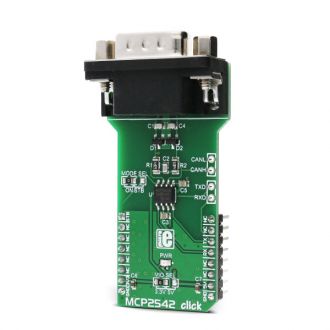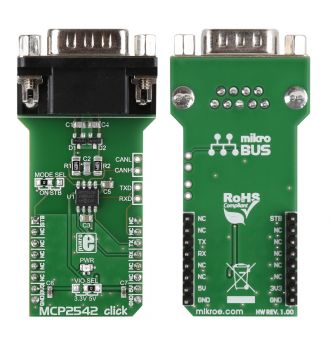
We strongly encourage users to use Package manager for sharing their code on Libstock website, because it boosts your efficiency and leaves the end user with no room for error. [more info]

Rating:
Author: MIKROE
Last Updated: 2018-05-24
Package Version: 1.0.0.1
mikroSDK Library: 1.0.0.0
Category: CAN
Downloaded: 6630 times
Not followed.
License: MIT license
MCP2542 click carries a Microchip CAN FD Transceiver compliant with CAN 2.0 and CAN with Flexible Data Rate (CAN FD).
Do you want to subscribe in order to receive notifications regarding "MCP2542 click" changes.
Do you want to unsubscribe in order to stop receiving notifications regarding "MCP2542 click" changes.
Do you want to report abuse regarding "MCP2542 click".


Library Description
Initializes and defines UART bus driver, and defines driver's functions for communication (reading and writing) between MCP2542 clicks.
Key functions:
Examples Description
The application is composed of three sections:
void applicationTask()
{
char tmp;
uint8_t rdyFlag;
// RECEIVER - UART polling
rdyFlag = mcp2542_byteReady();
if (1 == rdyFlag)
{
tmp = mcp2542_readByte();
mikrobus_logWrite( &tmp, _LOG_BYTE );
}
// TRANSMITER - TX each 2 sec
/*
for (tmp = 0; tmp < 9; tmp++)
{
mcp2542_writeByte( MESSAGE_DATA[tmp] );
mikrobus_logWrite( "MESSAGE SENT", _LOG_LINE );
}
Delay_ms(2000);
*/
}
Other mikroE Libraries used in the example:
Additional notes and information
Depending on the development board you are using, you may need USB UART click, USB UART 2 click or RS232 click to connect to your PC, for development systems with no UART to USB interface available on the board. The terminal available in all MikroElektronika compilers, or any other terminal application of your choice, can be used to read the message.